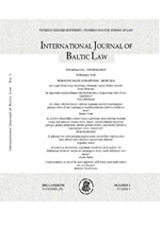Ar lingvistinis neapibrežtumas užkerta kelia teisesviešpatavimo (rule of law) isigalejimui?
Does linguistic indeterminacy prevent the domination of the rule of law?
Author(s): Tomas BerkmanasSubject(s): Law, Constitution, Jurisprudence
Published by: Florida Coastal School of Law and Vytautas Magnus University School of Law
Keywords: linguistic; indeterminacy; domination; rule of law
Summary/Abstract: According to traditional understanding of the rule of law in democratic mechanism, a legal norm is legitimate only when it is affirmed by the institution of the democratic mechanism elected by people, and every norm or it’s part, which is not affirmed by that institution or which is not based on such a norm, does not have any right to rule. Accordingly, norms, which rule, must do it strictly as they are. Nevertheless, in the contemporary academic literature we can find this kind of statements: “Interpretation of law is in no way an exact science but rather a judicial art.”212 This paper tries to reveal, why such statements arose in the legal academic writings, what the problems of such understanding are, and how we can understand interpretation differently. The paper concentrates exceptionally on the problem of linguistic indeterminacy in law and pays a lot of attention to the reflection of the ideas of Ludwig Wittgenstein in the legal academic writings. With the help of interpretation of Wittgenstein’s propositions, an autonomic conception of language is provided in Part I, and in Part II this conception is adjusted to analyze and solve the specifics of linguistic problems in law. Hypothesis of the paper is that “artistic value” of the interpretation of law, as reflection of linguistic indeterminacy, prevents the domination of the rule of law. In the end of the paper this hypothesis is negated. Language itself is not an obstacle in the way of law to its rule. By language a legislator can give a judge only discretion to regulate some clearly delimited spheres in the potentially linguistic domain of understanding. In other cases, judges must pronounce laws in accordance with already revealed rules of application of words and language, which are marked in dictionaries and grammars.
Journal: International Journal of Baltic Law
- Issue Year: 2002
- Issue No: 1
- Page Range: 26-56
- Page Count: 31
- Language: Lithuanian

